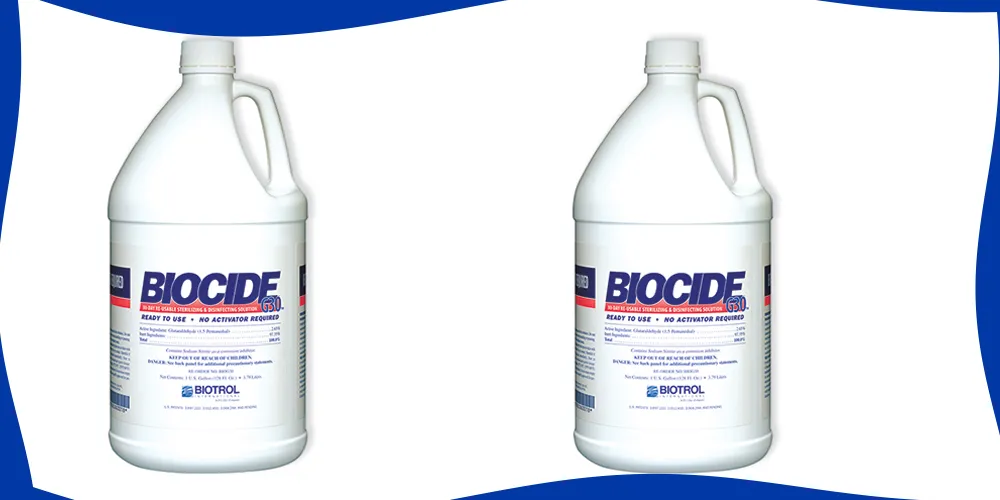Why Do You Need Microbiological Chemicals Like Biocide And Disinfectants?
The control of microbiological activity is an important, often safety-critical activity in many commercials, manufacturing, and industrial process applications such as Cooling Towers, Closed systems, Reverse Osmosis & Cold Water Storage Tanks. To ensure that such systems are safe, well maintained, and operate at optimum efficiency it is essential that the correct water conditions are maintained at all times. This can be achieved using carefully selected biocides and disinfectants. At advanced chemical and engineering, we make sure to provide you with the best.
In Which Consumer Products Are Biocides Used?
Biocides are for instance included in cleaning products.
Many consumer products contain biocides and disinfectants but the major sources of exposure in homes are the regular use of cosmetics and wipes, cleaning products, some toothpaste, laundry detergents, pet disinfectants, and general disinfectants.
Why Do We Use Biocides In Cosmetics And Personal Care?
Biocides are added to cosmetics and personal care products to prevent micro-organisms from growing on them. In the EU, the use of 57 different chemicals is allowed for this purpose. Besides these chemicals, cosmetics often contain other non-regulated antimicrobials.
Biocides For Household Needs:
Many of the biocides and disinfectants that are added to household products to improve their properties also kill bacteria. This is for instance the case of surfactants that are included in detergents to decrease the surface tension of water enabling the detergent to better penetrate and loosen dirt. Cleaning products and laundry detergents contain preservatives and disinfectants but the use of these substances in household products is not regulated. Surfaces coated with biocides have been developed recently. These biocide-treated surfaces include several active ingredients such as triclosan and metallic ions.
How Are Biocides Used In The Food Industry?
Biocides and disinfectants are widely used in the food industry as disinfectants and food preservatives.
They treat production plants, processing areas, and food containers to control the microbial growth in food and drinks. They are also commonly used to disinfect equipment, containers, surfaces, or pipes associated with the production, transport, and storage of food or drink, including drinking water. In the EU, the use of disinfectants in the food-processing industry and in the treatment of drinking water is regulated.
Disinfectant:
Disinfectants are chemical agents designed to inactivate or destroy microorganisms on inert surfaces. Biocides and disinfectants do not necessarily kill all microorganisms, especially resistant bacteria spores; it is less effective than sterilization, which is an extreme physical or chemical process that kills all types of life.
Why Disinfect?
Almost every environment on the planet contains bacteria and microorganisms. You might be surprised to learn that on one square inch of human skin there are more than 600,000 bacteria1. Most bacteria are harmless to humans. But disease-causing organisms – called pathogens – can be dangerous or even deadly. One of the most contagious and dangerous diseases in recent history is COVID-19, caused by the SARS-CoV-2 virus.
Pick The Right Disinfectant!
Using the right types of disinfectants routinely on surfaces throughout your facility is critical in helping prevent the spread of sicknesses and diseases like COVID, Influenza (flu), and the common cold. Since there are many types of disinfectants on the market, it’s important to understand how they work – including their pros and cons— in order to make an informed decision on how to use biocides and disinfectants and protect the occupants of your facility.
How Do Disinfectants Work?
Disinfectants are chemical agents applied to non-living objects in order to destroy bacteria, viruses, fungi, mold, or mildews living on the objects. By definition, disinfectant formulas must be registered with the Environmental Protection Agency (EPA). The “active ingredient” in each disinfectant formula is what kills pathogens, usually by disrupting or damaging their cells. Active ingredients are usually aided by other ingredients with various purposes. For example, surfactants can be added to biocides and disinfectants formula to provide consistent wetting on a surface or to help in cleaning. Trust advanced chemical and engineering with your products.
